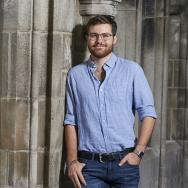While a University of Chicago student, Vivek Ramakrishnan studied disadvantaged communities in Chicago and at-risk youth across the country—transformative experiences that made him wonder: Who should receive government services and how do we effectively deal with scarcity?
“Reading the stories of children who have spent their lives in foster care and have had to navigate unbelievably difficult circumstances made me internalize how important it was to provide support to those involved in the system,” said the third-year student in the College.
Ramakrishnan believes data can be used to make an impact on government systems. Recently awarded a prestigious Harry S. Truman Scholarship, which provides up to $30,000 for students pursuing careers in public service, Ramakrishnan intends to explore how applied and predictive methods can be used to analyze the child welfare system.
“I think there is a future where data can be used to genuinely connect people with services who need it the most, and who are currently disconnected from support,” said Ramakrishnan, a public policy major. “I really want to be part of this defining moment to make sure the field moves in the right direction.”
Ramakrishnan was one of 62 students chosen for the nationally competitive award from a pool of 840 undergraduate candidates. He is the ninth UChicago student to earn the award in the past 10 years.
“We are proud that Vivek’s work and accomplishments have been recognized by the Truman Foundation,” said John W. Boyer, dean of the College. “His dedication to improving the child welfare system is a splendid example of the commitment our students have to improving our communities.”
After his first year in the College, Ramakrishnan worked for Chicago-based nonprofit MAPSCorps, leading 16 high school students around the city to collect data on resources and assets within various disadvantaged communities. The following summer, he worked as an intern in the data analytics unit of the Philadelphia Department of Human Services and completed a quantitative evaluation of youth at risk of aging out of the foster care system.
“It felt incredibly meaningful to work toward a data-driven vision of the system that is simultaneously fair to families and protective of children,” Ramakrishnan said.
On campus, Ramakrishnan currently serves as co-president of UAID, a student organization that runs annual initiatives addressing social determinants of health on the South Side of Chicago by forming partnerships with nonprofits, faith-based organizations and health care professionals. He is also a teaching assistant for Assoc. Prof. Anthony Fowler’s course on quantitative methods in public policy.
“Vivek is one of the brightest students I’ve had the pleasure to teach,” Fowler said. “While taking my course, he taught himself about machine learning algorithms that were outside the scope of the class, and I would have to consult a book or a colleague to keep up with him. More importantly, he is currently combining those cutting-edge quantitative skills with a passion for policy to improve the lives of disadvantaged youth.”
Ramakrishnan is interested in entering the joint bachelor’s/master’s degree program in computational analysis and public policy at the Harris School of Public Policy and plans to work for a state or municipal child welfare department and hopes to develop machine learning programs that help connect families and children with services more effectively. He one day hopes to pursue a PhD in economics and enter academia, researching how people interact with state systems to improve federal policy regarding data and machine learning.
“One of things I’ve been thinking through is how to apply data in more ethical and transparent ways, recognizing that machine learning programs are far from infallible and that data is often biased in a way that harms the most vulnerable in our society,” Ramakrishnan said. “I think the best applications of these programs is in a way that is supportive rather than punitive. I want to work with and within city governments to implement these programs and shape the direction of how data is used and applied.”
Ramakrishnan received application support from the College Center for Research and Fellowships, which guides candidates through rigorous application and interview processes for nationally competitive fellowships.

